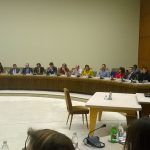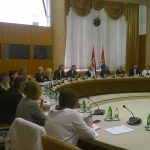The first meeting of the Inter-institutional working group for the establishment and the implementation of the National Qualification Framework in Serbia
The first meeting of the Inter-Institutional Working Group for the establishment and the implementation of the National Qualifications framework in Serbia (NQFS) was held today, in the Palace of Serbia.
The meeting was attended by the Assistant Minister for the Development and Higher Education Sector, Prof. dr Vesna Mandić, Steffen Hudolin, Head of Operations II, Delegation of the European Union to the Republic of Serbia as well as 46 members from 21 institutions, recognized as important social partners.
„One of the priority activities defined by the Annual Work Plan of the Government of the Republic of Serbia is the establishment of the National qualifications framework, the process which unfortunately lasted the past ten years. But at this precise moment, by the decision of Minister Šarčević, the Inter-Institutional Working Group is being formed, which includes 21 institutions, 46 members which are highly competent in the area “, Ms Mandić said.
Taking into account that the establishment and implementation of the NQF system in Serbia is of national importance and taking into account the overall reform processes of education and achievement of goals defined not only in the development documents of the Republic of Serbia, but also in significant strategic European documents, the necessity for defining the national qualifications framework has been recognised.
“Strong technological and economic changes have caused changes in all segments of society, especially in the world of work and the labour market. The new working environment has set new demands to the education”, dr Mandić said, adding that it is expected from the education sector to provide more employable individuals in a relatively short time, and to put into practice all gained knowledge and thusly improve his/her position on the labour market.“This moment is crucial for consolidating efforts in order to establish the National Qualifications Framework, which should bring the world of education and labour market closer, and introduce more efficient mechanisms for matching supply and demand for skills”, said Mr Hudolin.
Ms Mandić stressed that a special challenge will represent the referencing NQFS to EQF, which will enable the comparation of the acquired qualifications, i.e. the mobility of the work force on the European market will be additionally encouraged.
Continuous and active participation of both strategic and operational members in the further development of the NQFS will provide the necessary fundamental national and institutional approach in establishing the National Qualifications Framework in Serbia.




